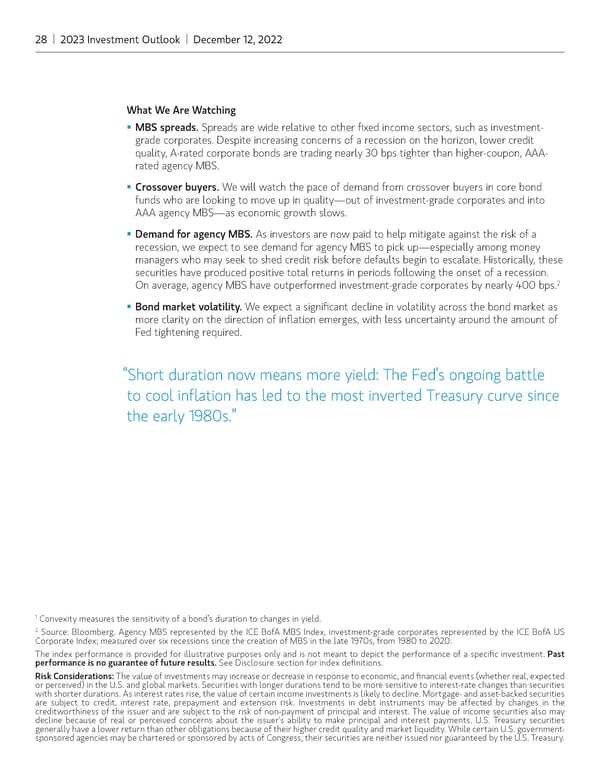28 | 2023 Investment Outlook | December 12, 2022 What We Are Watching ƒ MBS spreads. Spreads are wide relative to other fixed income sectors, such as investment- grade corporates. Despite increasing concerns of a recession on the horizon, lower credit quality, A-rated corporate bonds are trading nearly 30 bps tighter than higher-coupon, AAA- rated agency MBS. ƒ Crossover buyers. We will watch the pace of demand from crossover buyers in core bond funds who are looking to move up in quality—out of investment-grade corporates and into AAA agency MBS—as economic growth slows. ƒ Demand for agency MBS. As investors are now paid to help mitigate against the risk of a recession, we expect to see demand for agency MBS to pick up—especially among money managers who may seek to shed credit risk before defaults begin to escalate. Historically, these securities have produced positive total returns in periods following the onset of a recession. 2 On average, agency MBS have outperformed investment-grade corporates by nearly 400 bps. ƒ Bond market volatility. We expect a significant decline in volatility across the bond market as more clarity on the direction of inflation emerges, with less uncertainty around the amount of Fed tightening required. “Short duration now means more yield: The Fed’s ongoing battle to cool inflation has led to the most inverted Treasury curve since the early 1980s.” 1 Convexity measures the sensitivity of a bond’s duration to changes in yield. 2 Source: Bloomberg. Agency MBS represented by the ICE BofA MBS Index, investment-grade corporates represented by the ICE BofA US Corporate Index; measured over six recessions since the creation of MBS in the late 1970s, from 1980 to 2020. The index performance is provided for illustrative purposes only and is not meant to depict the performance of a specific investment. Past performance is no guarantee of future results. See Disclosure section for index definitions. Risk Considerations: The value of investments may increase or decrease in response to economic, and financial events (whether real, expected or perceived) in the U.S. and global markets. Securities with longer durations tend to be more sensitive to interest-rate changes than securities with shorter durations. As interest rates rise, the value of certain income investments is likely to decline. Mortgage- and asset-backed securities are subject to credit, interest rate, prepayment and extension risk. Investments in debt instruments may be affected by changes in the creditworthiness of the issuer and are subject to the risk of non-payment of principal and interest. The value of income securities also may decline because of real or perceived concerns about the issuer's ability to make principal and interest payments. U.S. Treasury securities generally have a lower return than other obligations because of their higher credit quality and market liquidity. While certain U.S. government- sponsored agencies may be chartered or sponsored by acts of Congress, their securities are neither issued nor guaranteed by the U.S. Treasury.
 Morgan Stanley 2023 Investment Outlook Page 27 Page 29
Morgan Stanley 2023 Investment Outlook Page 27 Page 29